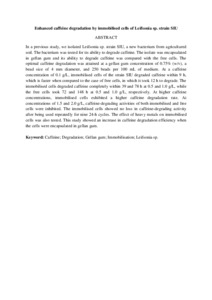Citation
Ibrahim, Salihu and Abd Shukor, Mohd Yunus and Syed, Mohd. Arif and Wan Johari, Wan Lutfi and Shamaan, Nor Aripin and Sabullah, Mohd Khalizan and Ahmad, Siti Aqlima
(2016)
Enhanced caffeine degradation by immobilised cells of Leifsonis sp. strain SIU.
The Journal of General and Applied Microbiology, 62 (1).
pp. 18-24.
ISSN 0022-1260; ESSN: 1349-8037
Abstract
In a previous study, we isolated Leifsonia sp. strain SIU, a new bacterium from agricultured soil. The bacterium was tested for its ability to degrade caffeine. The isolate was encapsulated in gellan gum and its ability to degrade caffeine was compared with the free cells. The optimal caffeine degradation was attained at a gellan gum concentration of 0.75% (w/v), a bead size of 4 mm diameter, and 250 beads per 100 mL of medium. At a caffeine concentration of 0.1 g/L, immobilised cells of the strain SIU degraded caffeine within 9 h, which is faster when compared to the case of free cells, in which it took 12 h to degrade. The immobilised cells degraded caffeine completely within 39 and 78 h at 0.5 and 1.0 g/L, while the free cells took 72 and 148 h at 0.5 and 1.0 g/L, respectively. At higher caffeine concentrations, immobilised cells exhibited a higher caffeine degradation rate. At concentrations of 1.5 and 2.0 g/L, caffeine-degrading activities of both immobilised and free cells were inhibited. The immobilised cells showed no loss in caffeine-degrading activity after being used repeatedly for nine 24-h cycles. The effect of heavy metals on immobilised cells was also tested. This study showed an increase in caffeine degradation efficiency when the cells were encapsulated in gellan gum.
Download File
![[img]](http://psasir.upm.edu.my/54158/1.hassmallThumbnailVersion/Enhanced%20caffeine%20degradation%20by%20immobilised%20cells%20of%20Leifsonia%20sp.%20strain%20SIU.pdf)  Preview |
|
Text
Enhanced caffeine degradation by immobilised cells of Leifsonia sp. strain SIU.pdf
Download (7kB)
| Preview
|
|
Additional Metadata
Actions (login required)
 |
View Item |

